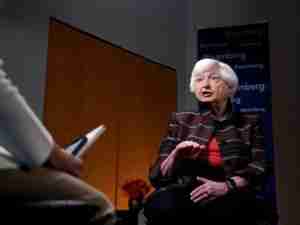Mexican Peso Gets BofA’s Thumbs Down as More Trump Trouble Looms
By: Isabella Cota | Aug 03 2017 at 05:00 AM | International Trade
Bank of America has a warning for the investors pouring into the Mexican peso this year: It’s time to be cautious.
Strategist Claudio Irigoyen says the currency is overvalued after posting the top gain among its major peers in 2017 and should fall as much as 3 percent by the end of the year to 18.5 per dollar. His bearish view is in contrast to bullish calls from peers at Wall Street banks including Morgan Stanley and Wells Fargo & Co., who predict the rally still has steam.
Irigoyen says peso buyers are too sanguine about the outlook for Donald Trump’s administration and his push to renegotiate the North American Free Trade Agreement, which could put a damper on the exports Mexico’s economy depends on. He also sees risks from slower growth and the possibility that elections next year could usher in a president who is less supportive of business and markets.
“The peso was the whipping boy when the market was pricing in an aggressive Trump policy,” according to Irigoyen, who said 90 percent of his team’s trade recommendations this year have been on the money. “But I think the market went too far in removing all the risks from Mexico.”
He says these are the three key concerns for peso investors:
1. Nafta talks could go badly, or at least be volatile.
“Negotiations will be bumpier than the market expects,” Irigoyen says. Investors are under the impression that the renegotiation will be little more than an update of a 23-year accord, but talks among the three countries may be more tense than that.
With Trump’s broader agenda suffering setbacks in Washington, it’s possible he’ll want to use the Nafta talks to score political points, and that could be bad for Mexico.
“They might have an incentive to show that they did a great job on renegotiating Nafta in their favor,” he said.
2. Mexican economic growth is likely to slow down.
“We’re going to start seeing the effect of tight fiscal and monetary policy down the road in the second half” of the year, Irigoyen said. “The market got too excited on the first quarter which was better than expected because exports did very well” thanks, mostly, to a weak exchange rate late last year.
3. Next president may not be market-friendly.
Andres Manuel Lopez Obrador, currently leading polls before the July 2018 vote, has vowed in past presidential bids to crack down on business interests and champion social spending. More recently, he has pledged to keep debt in check and said he would respect the autonomy of the central bank. But as other candidates are announced, he will inevitably be pushed further into the anti-business camp to differentiate himself, Irigoyen argues.
“He has been for years running on the leftist side,” the strategist said. “It’s quite difficult to think that he thinks that country should be run from the center.”








